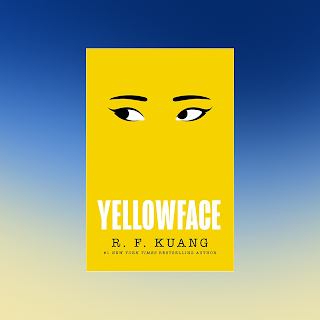Book Review: Yellowface by R. F. Kuang
“The cultural constructions are clear: so many Chinese ghosts are hungry, angry, voiceless women. In taking Athena's legacy, I've added one to their ranks. . . . I feel like a meme of a clueless white person.
“The wildest thing about all this is that even now I cannot stop composing. I'm trying to funnel this awfulness into something lovely. My salacious roman à clef will become a horror novel. My terror will become my readers' terror. I will take my fugue state of delirious panic and compost it into a fertile bed of creativity — for aren't all the best novels borne from some madness, which is borne from truth?
“Perhaps, if I can capture all my fears and constrain them safely on the page, this will rob them of their power. Don't all the ancient myths tell us that we gain control over a thing once we name it?”
📚
Yellowface by R. F. Kuang is a blistering examination of and commentary on the publishing industry, society, racism, and cultural appropriation that opens with friends, authors, and fellow Yale graduates June Hayward and Athena Liu. Both made their publishing debuts at the same time, but Athena is a runaway success while June languishes in a literary wasteland. That is, until Athena dies and June impulsively steals her next unfinished novel — a magnum opus concerning the efforts of Chinese laborers in World War I. June, a white woman, takes it upon herself to finish and claim the story as her own.
From the get-go, June is a profoundly unlikeable protagonist, and I felt an intense and immediate sense of anxiety that grew as the story progressed. Her cold-hearted, calculating, and pathological dishonesty, pretension, narcissism, entitlement, lack of sincerity and empathy, and warped sense of self combined to produce an archetype of ignorance and privilege.
Underscored by a hollow, exploitative, and disingenuous society and publishing industry, the story is layered and full of twists and turns that leave the reader feeling not only extremely anxious and uncomfortable, but outright repelled. The book is composed of layer upon layer of lies, stealing, and manipulation, to the point that the reader feels exhausted, overwhelmed, and almost disgusted by the end, as though everything is tainted by jealousy, hatred, and dishonesty and no one is honest, real, or worthy.
Initially presented as a surface-level character, June appears to be an evil, book-stealing automaton without feelings, conscience, or remorse until past the midpoint, after which important backstory is revealed, as are June’s motivation and distorted self-justification. It was at this point that the reader sees certain characters from a new vantage point and feels the depressing hollowness associated with June’s ill-gotten success.
In addition to these negative and convoluted feelings, the reader is also left with many questions which would, without a doubt, make this a great book club pick.
- Who has the right to tell certain stories?
- What does it mean for art to imitate life (and vice versa)?
- What is defined as stealing and what is defined as borrowing or inspiring when it comes to writing and other forms of art?
- Why does our society marginalize certain stories and voices while choosing to give others a platform?
- And so many more . . .
I’ve seen this book referenced as a satire, and while it never came across as funny, it certainly appeared to use exaggeration and irony to criticize, expose, and ridicule our society’s vices and ineptitude where racism, cultural appropriation, and the digital world are concerned.
I loved Babel: An Arcane History and couldn’t wait to get my hands on this book, and it was a layered, thought-provoking, and disquieting read that will linger in my mind for a long time to come. R. F. Kuang will be an auto-read for me moving forward, and I can’t wait to see what she produces next.
❤Amanda
Disclaimer
Many books featured on this blog were purchased by us; however, we do accept publisher-, author-, and other source-provided copies (both advanced reader copies (ARCs) and finished copies) from publishers, authors, and other sources we deem to be a good fit for our reading preferences and blog. Posts and reviews that feature such copies are disclosed. For more information, refer to the Disclaimer & Disclosures section.
Some of the links in this post may be affiliate links, which means that when you click one of those links and make a purchase, we earn a small commission paid by the retailers, at no additional cost to you. These links will take you to books and other products that we like, trust, and believe will be beneficial to our readers. Affiliate programs use cookies to track visits in order to assign sale-related commissions; funds earned keep the Site up and running and allow us to continue to share reviews and other content. Thank you for your support!



Comments
Post a Comment